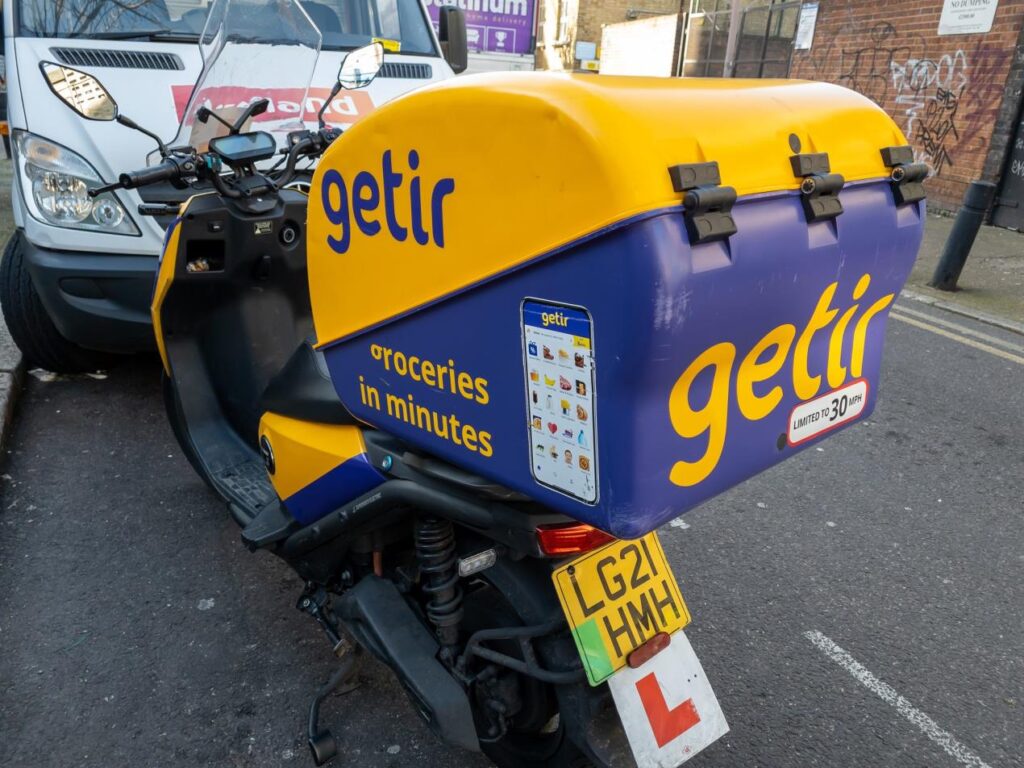Why Getir got out of here – is the jig up for the gig economy, asks Parcelhero?

Getir, the grocery delivery company that was valued at $12bn just two years ago, quit the UK this week, and is leaving the US and western Europe. The home delivery expert Parcelhero says establishing a sustainable home delivery network is expensive and the ultra-fast food delivery market looks unappetising post-Covid.
Getir, once the poster child of the rapid delivery market, has pulled the plug on its UK and US operations, as well as its remaining European services outside its home market of Turkey. The home delivery expert Parcelhero says it’s a warning that establishing a successful home delivery network is expensive and complex. It cautions ultra-rapid deliveries are especially costly, particularly those based on Getir’s hybrid gig-economy model.
Parcelhero’s Head of Consumer Research, David Jinks M.I.L.T., says: ‘At the beginning of the year, Parcelhero warned the food and grocery delivery market had a bad case of indigestion and predicted there would be casualties. Online food sales fell by -13% YOY in 2022 as people returned to restaurants and fast-food outlets and sales continued to tumble last year. Services such as London’s Jiffy, Bother, Oja and Gorillas disappeared and we couldn’t see how a number of surviving services could be sustainable long-term.
‘Getir’s ultra-fast grocery network looked particularly vulnerable. Its hybrid gig economy model meant it gave its couriers hourly pay rather than per delivery as, for example, Deliveroo does. That’s not sustainable on the margins its users were prepared to pay for the convenience of 10-minute deliveries. The promotional offers it launched within the UK in September 2021 looked too good to be true, and that’s because they were. As it was forced to charge a saner amount after its initial funding revenues were burned through, orders declined.
‘That was a big problem for Getir as falling sales meant further private equity and venture capital funding also started to dry up. Tech start-ups are very reliant on continuous investment. To look at the scale of the difficulties facing Getir, it’s worth noting that rival Uber Eats’ parent company, Uber, made its first operating profit just last year, yet it was founded in 2009. That’s 14 years of losses. Investors need patience and deep pockets to support tech start-ups.
‘Getir’s whole model was also more expensive than, for example, Deliveroo’s restaurant delivery service. Getir created its own dark stores (small fulfilment centres packed with groceries and household essentials). That added cost and complexity.
‘In a remarkable exercise in chest-beating, Getir also paid £1.2bn for its closest rival, Gorillas, a company based on a similarly flawed model. To add insult to injury, Deliveroo, Just Eat and Uber Eats started stealing Getir’s lunch by offering grocery deliveries with lower overheads in addition to their existing restaurant service. Meanwhile, Ocado ramped up its same-day offering with its Zoom service. Deliveroo’s straight gig economy model of just paying its riders for each delivery carries far less overheads.
‘The home delivery market is not to be entered lightly. Retailers and investors need to be cautious when choosing partners. Getir’s latest funding round has evidently come at a price. A company statement says: “Getir has raised a new investment round, led by Mubadala and G Squared. Getir will utilise these funds to bolster its competitive position in its core food and grocery delivery businesses in Turkey.” Clearly, its investors were unwilling to see good money poured after bad, and with sound reason. Staggeringly, it has now revealed the UK, US and remaining European services outside of Turkey accounted for just 7% of the company’s total revenue.
‘The fact is that home delivery is not cheap. Businesses spend between 5% to 30% of their entire annual revenue on shipping, with billions of pounds wasted every year on inefficient processes and often inflated costs. It’s with this in mind that Parcelhero is introducing our own SaaS (software as a service) platform to enable retailers to reap the economies of scale that our individual customers enjoy.
‘Parcelhero Pro’s cutting-edge technology will enable businesses to ship in bulk, optimise cost and completely outsource their after-sales customer support. It is set to disrupt the domestic and international B2B logistics industry when it launches this year. It uses groundbreaking technology to give retailers and other growing businesses an end-to-end shipping solution that will enable them to manage and automate every aspect of their shipping, saving time, money and hassle.
‘Unlike many operators in the ultra-fast grocery delivery market, Parcelhero has a proven track record in the home delivery parcels market. The Parcelhero Group has already outpaced all its competitors with 17% compound annual growth rate (CAGR) in revenue between 2012 and 2022 (including 21% CAGR from 2019-22), making it the UK’s fastest-growing logistics comparison group. It had revenues of £25m in 2022 and is forecast to achieve a revenue of £99m in 2028.
‘To realise our vision, we are inviting support from forward-thinking investors. That’s why we are now launching our equity funding campaign on Floww. Floww is an internationally accredited fundraising and investment platform, enabling high net worth individuals (HNWI), angel investors and venture capitalists to invest in private companies.




